Welcome back to my blog.
I spent much of this week attending the Knights of Columbus Annual Convention in Tennessee. However, before I left, I had the opportunity to attended the annual Family Day for Boston seminarians which the Vocations Office organizes each summer.
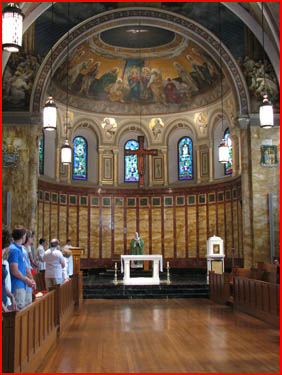
We have a Mass followed by a cookout with the seminarians and their families. The celebration has been an opportunity to meet the families of the new seminarians.
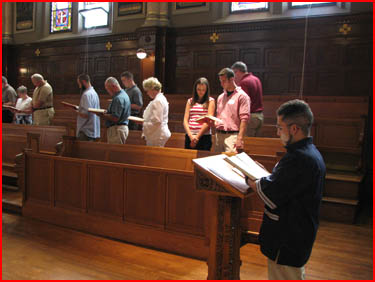
Seminarian Carlos Suarez sings at the Family Day Mass
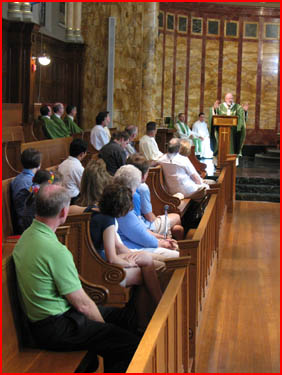
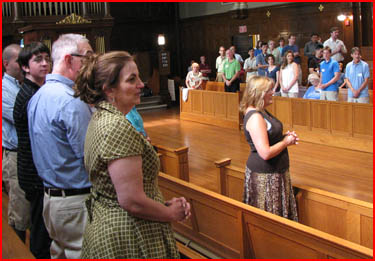
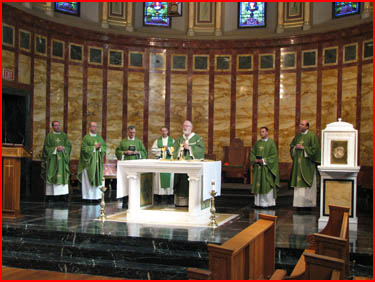
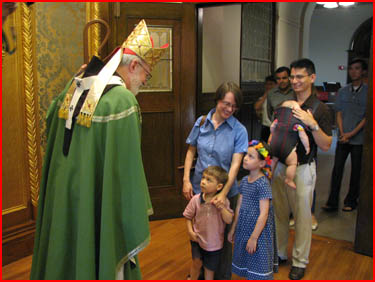
Its always nice to have an opportunity to meet the families of our seminarians
This year the barbeque was on Sunday, and it was a perfect day weather-wise. It was wonderful to be able to meet the seminarians, their parents, brothers and sisters who came as well as an opportunity for them to meet each other.
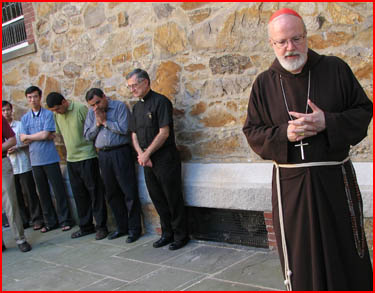
Leading grace
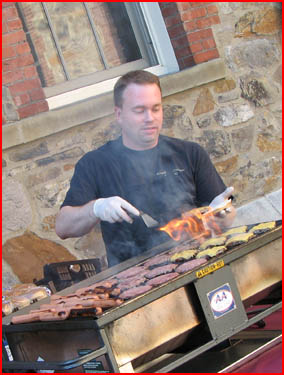
The weather was perfect for a cookout
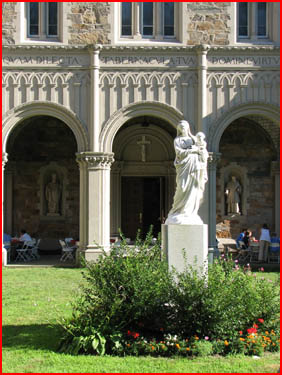
– – –
Each year at the beginning of August, the Knights of Columbus have their convention, and I always go with the delegation from Massachusetts. This year, there were about 80 knights and their wives from the Commonwealth attending. Bishop Daniel P. Reilly – who is the Knights’ chaplain and retired bishop of Worcester – went with us as well as Fall River Bishop George Coleman and the two Melkite bishops, Archbishop Cyril Bustros and retired Bishop John Elya.
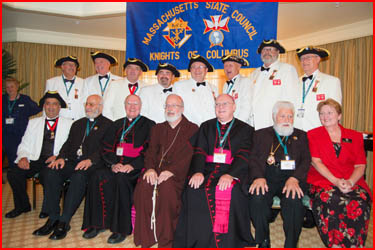
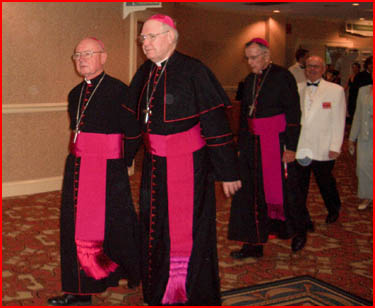
Bishop Reilly (on the right) is the State Chaplain of the Knights
The meeting was the 125th anniversary of the Knights of Columbus and was held in Nashville, Tenn. I never thought I would live long enough to see Nashville, but it was a very interesting place and it is, of course, famous for its country-western music.
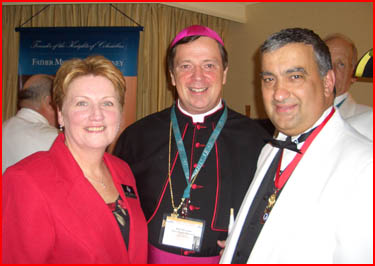
Bishop Bob Hennessey with Mass. State Deputy Vincent Rumasuglia and his wife Renie
The hotel had these huge atriums, they call them. They are outdoor areas under glass so that even though it was 101 degrees outside, we were in an air-conditioned outdoor place. It was very unusual, but a beautiful setting.

The atrium of the hotel was like a small neighborhood under glass!
This year for the first time, Cardinal Tarcisio Bertone came to the convention. He is the Vatican’s secretary of state, the position which is sort of the second-in-charge in the Church. One can think of it as being something like being the vice president in the United States.
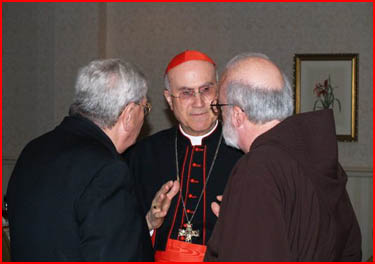
Greeting Cardinal Bertone together with
the Nuncio to the U.S. Archbishop Pietro Sambi
Cardinal Bertone was the main celebrant at the opening Mass. However, he does not speak English so he celebrated the Mass in Latin and Italian. He preached in Italian, but they had simultaneous translation for the people. He gave a beautiful homily, very much focused on the life and legacy of Father Michael J. McGivney, the founder of the Knights of Columbus.
The convention was Cardinal Bertone’s first visit to the States in his role as secretary. He was given an award by the Knights, the Gaudium et Spes Award, the organization’s highest honor.
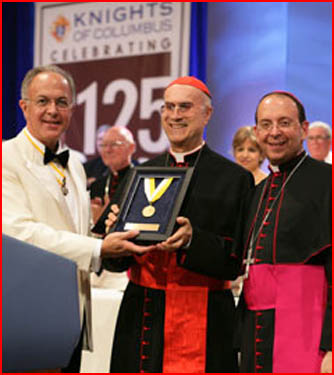
Cardinal Bertone receives his award.
On the right is Bishop William Lori of Bridgeport who is
Supreme Chaplain to the Knights
He addressed the assembly the next day and focused on the role of the laity in the Church. I want to share that significant address with you:
First of all, allow me once again to express my sincere gratitude to Supreme Knight Carl A. Anderson and fellow Knights for the invitation to visit Nashville for this historic 125th Supreme Convention of the Knights of Columbus. I am honored by the opportunity to address all of you this evening on a topic as dear to me as it is to His Holiness Pope Benedict XVI: “Faith in Action: Witnessing to the ‘Yes’ of Jesus Christ.”
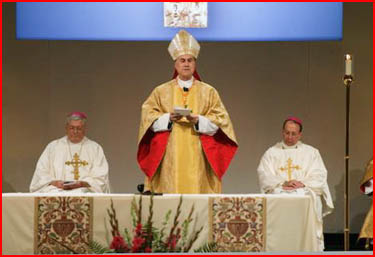
Presiding the opening Mass the day before
This evening, I will reflect on the importance of this “Yes” for the Church’s lay faithful. I will indicate some of the primary characteristics of the lay vocation within the Church and in society at large, and I will point to a few particular challenges facing the laity today.
Both in his work as a theologian and now in his ministry as the successor of Peter, His Holiness Pope Benedict XVI has repeatedly drawn attention to the distinctive and irreplaceable role of the laity in the renewal of the Church’s mission in the modern world. At 78 years of age, Pope Benedict said “Yes” to his brother cardinals, to the Church, and to the Holy Spirit when he was asked to accept the Petrine ministry after the long and remarkable reign of the Servant of God, Pope John Paul II. The Holy Father’s willingness to assume pastoral duties as Chief Shepherd of the universal Church bore witness to the fundamental attitude required of every Christian — Pope, Bishop, priest, consecrated, or lay person; it is the disposition exemplified in our Lady’s humble but sure response to the Lord’s heavenly messenger in Nazareth: “Fiat!” — “Yes!”
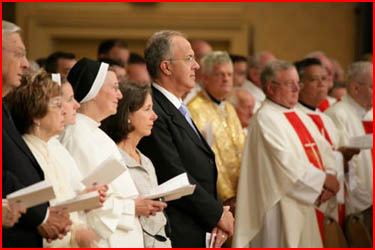
The “Yes!” of Faith in Jesus Christ
But what exactly is the essence of this “Yes”? More specifically, how is one to live it out as a member of the laity?
In regard to the first question, this “Yes” is quite simply the “Yes” of faith. It is our full, unmitigated acceptance of Jesus as Lord and our commitment to follow him as master and teacher. Indeed, the word “Yes” only makes sense within the context of a dialog between two persons: someone who utters the “Yes” and someone who accepts it. In the case of faith, the person to whom we utter this “Yes” is none other than the Son of God, the Anointed One, the Eternal Word made flesh. Pope Benedict has emphasized the critical need for each of us to encounter Jesus; more importantly, he has shown and continues to show — both in his words and through his life — that true fulfilment, joy, and lasting peace can only be found by saying “Yes” to God’s plan of salvation as revealed in the person of Jesus Christ. Only in intimate communication with the incarnate Son of God do we discover the grace to “put our faith into action.”
Your founder Father Michael McGivney was prophetic — indeed, well ahead of his time — in that he clearly understood that this complete and total “Yes” to Christ was in no way exclusive to those who received holy orders or had taken religious vows. On the contrary, it is a “Yes” required of every man and every woman.
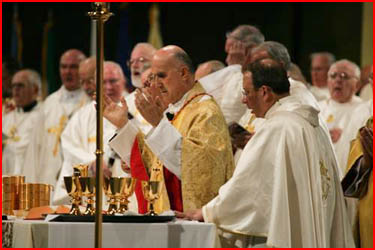
As a young curate at Saint Mary’s Church in New Haven, Father McGivney became keenly aware of the laity’s need to be actively and fully engaged in the life of the Church by exercising virtue, cultivating prayer, and caring for others. He had a deep appreciation for the special characteristics of the lay vocation as being thoroughly immersed in the spheres of the family, civil society, and public life. He made it his goal to develop practical ways of ensuring that faith could be put into concrete action: especially by providing for the material needs of orphans, widows, the imprisoned, alcoholics, the unemployed, and the destitute.
However, it is sometimes easy to forget that Father McGivney’s conviction was based on an even more fundamental insight: namely, that our concern for the needy and our perseverance in charitable works will eventually become attenuated and deprived of their deeper meaning if they are not rooted in faith — faith understood as the indwelling of Holy Trinity in our hearts through divine grace as we renew our “Yes” each day to the person of Jesus Christ.

Father Michael J. McGivney
Faith and Love
This is precisely the message Pope Benedict XVI conveys through his Encyclical Letter Deus Caritas Est. When asked why he devoted his first Encyclical to the theme of love, he replied that he wished to manifest the humanity of the faith. Only by living the life of faith — that is, only by deeply immersing ourselves in the love and mercy of God as revealed in Jesus Christ — are we able to love and forgive our neighbor as ourselves. When it comes to living this faith in the midst of an increasingly complex and contradictory world, no one knows more about the obstacles and challenges that can so easily discourage us than the Church’s laity. Whether in family life, in the workplace, or in the public square, lay persons are continually tempted to compromise their “Yes” to God by diluting Gospel values and by placing limits or conditions on love of neighbor.
The Holy Father underlined the unique challenges posed by the contemporary world to the lay vocation during his Pastoral Visit to Brazil. Noting that America is a “continent of baptized Christians,” he asserted that “it is time to overcome the notable absence — in the political sphere, in the world of the media and in the universities — of the voices and initiatives of Catholic leaders with strong personalities and generous dedication, who are coherent in their ethical and religious convictions.” The Pope insisted strongly that it is necessary for Christians who are active in these social and cultural milieus to strive to safeguard ethical values. Above all, he said, “Where God is absent — God with the human face of Jesus Christ — these values fail to show themselves with their full force, nor does a consensus arise concerning them. I do not mean that non-believers cannot live a lofty and exemplary morality; I am only saying that a society in which God is absent will not find the necessary consensus on moral values or the strength to live according to the model of these values, even when they are in conflict with private interests.” In short, being a Catholic in the world today takes courage; yet it takes no more courage than it did when Jesus called his first disciples in Galilee.
The role of the lay faithful: VaticanII and Benedict XVI
The Holy Father frames his teaching on the role of the laity within the context of the Second Vatican Council, and interweaves it in an unbroken line with the teaching of Pope John Paul II. The guiding principle is always the same: namely the “universal call to holiness.”
“It is quite clear,” the Council fathers teach us, “that all Christians in whatever state or walk of life are called to the fullness of Christian life and to the perfection of charity.” Insofar as it is a call to holiness, the call to the lay state is no less a “vocation” than that of the priesthood or religious life. It has its own distinctive nature, which is absolutely essential to the healthy, overall functioning of the Body of Christ, the Church. Lumen Gentium explains: “It is the special vocation of the laity to seek the Kingdom of God by engaging in temporal affairs and directing them according to God’s will.”
Clearly, if lay persons are to “carry out” and “develop” temporal matters according to “Christ’s way,” they must first know Christ. They must take seriously Saint Paul’s exhortation to have “the mind of Christ.” This vision of the Church as proposed by Saint Paul and elaborated by the Second Vatican Council demands not only our active engagement with the world, but primarily our active engagement with the person of Jesus. Otherwise, we can easily fall into the trap of confusing the way of Christ with the ways of the world.
Through Christ’s passion, death, resurrection and ascension, he has renewed the face of the earth; but — as is evident in the words he speaks in the Gospel of Saint John — the “world” still “has not known” Christ, and in fact often “hates” Christ. It is no surprise then that Christians often encounter resistance, opposition, and even persecution in the world. Pope Benedict reminds us that the only possible response for a Christian in the face of rejection is love — a response made possible for us through the grace of Christ. Because God’s very existence is love, love is the very essence of the Christian life. The universal call to holiness is about patiently, deliberately, and “programmatically” sharing this love with the world. It is for this reason that the metaphor of “leaven” — used by our Lord and adopted at the Second Vatican Council — so aptly describes the concrete reality of living as a Christian in this world: the work of Christians is often hidden, but nonetheless steady and consistent, causing the entire dough to rise.
“The Church sets out with humility on her journey, between the sorrows of this world and the glory of the Lord. On this journey, we will need to grow in patience.” Nevertheless, as the Holy Father noted, “the Catholic Church grows in every century. Today too, the presence of the Crucified and Risen Lord is growing. He still has his wounds, yet it is precisely through his wounds that he renews the world, giving that breath which also renews the Church despite our poverty…In this combination of the humility of the Cross and the joy of the Risen Lord…we can go ahead joyfully, filled with hope.”
Enthusiasm and boldness, filled with hope, have always been characteristic of the Knights of Columbus, and this will no doubt remain at the heart of their apostolate in the future.
Cooperation in the Church: A Challenge and an Opportunity
I would like to pause for a moment to reflect on this point. Our integral and persuasive witness to the truth of the Gospel depends heavily on the ability of Bishops, priests, deacons, religious and laity to work together for the spread of God’s Kingdom by acknowledging the distinctive role of each vocation within the Body of Christ. For the Knights of Columbus, perhaps this is most clearly evident at the parish level. How wonderful it is to behold the pastor, the local council of Knights, and the rest of the parish mutually supporting one another as they each exercise their unique forms of service for the building up of the local community!
During your time together at this 125th Supreme Convention, I would invite you to encourage and inspire one another by sharing experiences and ideas of how to facilitate effective cooperation between yourselves, your Bishops, your pastors, members of the parish staff, and the civic communities in which you live and work. If your local community is suffering from the wounds of division, be they large or small, take the opportunity to deepen your cohesion, since when this is lacking in a parish family or a local Church, the ability to witness to Christ in the larger society is weakened. At such times, prayer and faith are all the more essential to bring about healing and reconciliation. Pope Benedict writes: “the Spirit is…the energy which transforms the heart of the ecclesial community, so that it becomes a witness before the world to the love of the Father, who wishes to make humanity a single family in his Son.”
Benedict XVI’s Pauline Vision of the Church
On June 28th — the eve of the Solemnity of Saints Peter and Paul — Pope Benedict announced the opening of a special Jubilee year commemorating the bimillenary of Saint Paul’s birth. Over the next year, the Church will reflect on the life and writings of this great “Apostle to the Gentiles.”
In fact, the vivid images Paul uses to describe the Church — both at the local and universal level — have always been very dear to His Holiness. He employs them often in more informal discussions with clergy and laity.
For example, in responding to a question addressed to him during an audience with members of the clergy of the Diocese of Rome, the Holy Father recently said: “The Church, though a body, is the body of Christ and therefore a spiritual body, as Saint Paul teaches. This seems extremely important to me: that people will be able to see the Church not as a super-national organization, not as an administrative body or means for power and domination, not as a social agency — even though she carries out a social and ‘supra-national’ mission — but rather as a spiritual body.
Pope Benedict is not only a man of deep theological wisdom; he also brings to the Petrine ministry extensive pastoral experience. He has no illusions about the serious challenges confronting local ecclesial communities today.
One such challenge is the tendency to focus too narrowly on the administrative, bureaucratic, and financial aspects of parish and diocesan life. Not that these are unimportant — on the contrary! However, we end up viewing worldly realities through a distorted lens if we fail to see them with the eyes of Christ. We can only be prudent stewards of worldly goods if we freely subject them to the good of eternal life.
Every concrete method and strategy taught and promoted by Father McGivney in the public square was aimed at the good of the human person destined for eternal life. Father McGivney’s legacy lives on today in the Knights’ continuing effort to keep themselves — and others — informed about complex issues regarding human life, justice, freedom, and the common good.
Friendship and Joy: The Key to Understanding Pope Benedict XVI
Finally, I must say a word about two recurring themes in Pope Benedict’s teaching which are absolutely essential for the “animation” of “the entire lives of the lay faithful”: friendship and joy. These, I believe, are the keys for grasping Pope Benedict’s thought on what it means to translate faith into action.
The words “friendship” and “joy” echo continuously throughout his preaching, especially when he addresses himself to young people as they prepare to gather for the 2008 World Youth Day in Sydney. According to Pope Benedict, “friendship” and “joy” have God as their primary reference. The Holy Father never tires of reminding us that God is near, that he is our friend, and that he is constantly speaking to us about the most essential things in life. He accompanies us on our journey through this life, in our joys and sorrows, and — as a Good Shepherd who cares only for his flock — he never abandons us.
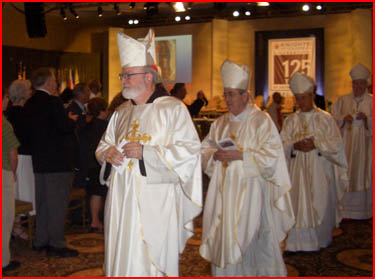
At the 2005 World Youth Day in Cologne, His Holiness said this to the young people present: “A true revolution can take place only by radically turning to God without reserve; he alone is the measure of all that is just, while at the same time existing as love eternal. And what could possibly save us if not love?”
Love is the source of the Holy Father’s inspiration in all that he undertakes, and especially in his commitment to dialogue. He has spoken with countless lay persons, listening attentively to their practical ways of reasoning. He truly follows the agenda he set for himself at the beginning of his pontificate: “My true program for governing the Church is not to carry out my own will or pursue my own ideas, but to place myself together with the entire Church in listening to the Word of the Lord, discerning his will, and allowing myself be led by him, because he alone will guide the Church through this phase of history.”
The Holy Father always teaches with clarity and precision, and with a spirit of humility and encouragement. He wants everyone to understand how beautiful and fulfilling it is to be a Christian, to experience a personal, living encounter with a life-changing “event,” to meet the One who opens a whole new horizon and gives life a new, decisive direction. It is precisely for this reason that even the commandments are never too burdensome for us if we are abiding with Christ.
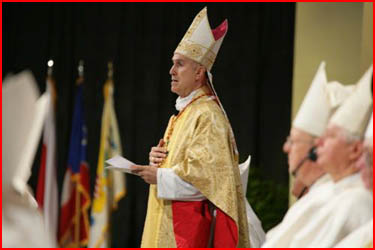
In his first public interview after having been elected Pope, the Holy Father summarized his deepest wish, both for young people and for the entire world:
“I want them to understand that it is beautiful to be a Christian! The generally prevailing idea is that Christians have to observe an immense number of commandments, prohibitions, precepts, and other such restrictions, so that Christianity is a heavy and oppressive way of living, and it would therefore be more liberating to live without all these burdens. But I would like to make it clear that to be sustained by this great Love and God’s sublime revelation is not a burden, but rather a set of wings — that it is truly beautiful to be a Christian. It is an experience that gives us room to breathe and move, but most of all, it places us within a community since, as Christians, we are never alone: first of all, there is God, who is always with us; secondly, we are always forming a great community among ourselves: a community of people together on a journey, a community with a project for the future. All of this means that we are empowered to live a life worth living. This is the joy of being a Christian; that it is beautiful and right to believe!”
Indeed, how beautiful it is to believe, for to believe is to say “Yes” to Christ; and to say “Yes” to Christ is to bear witness to our faith in action. My dear Knights of Columbus, may you always remain men firmly committed to this “Yes” — “Yes” to your families, to your Church, and to your communities — but most importantly, to Christ who is the “Yes” to all our hopes and desires. God bless you all.
The convention was opened by Carl Anderson, who is the supreme knight. The meeting began with a letter from the Holy Father. Then, there was a video greeting from President George Bush.
I was very impressed by what the president had to say, particularly about the work of the Knights of Columbus in making this a better country. He reiterated his support for the Gospel of Life, and it was to me a reminder of why there were so many Catholics who had voted for this man in the last election. Although everyone is focused on the terrible tragedy of the war and how unpopular this president is now, his message to the Knights of Columbus and the good things he had to say impressed me.
Following that, they read a letter from Prime Minister of Canada Steven Harper, also praising the work of the Knights of Columbus. That was followed by a letter from Gloria Arroyo, president of the Philippines. There was another letter from Mexican president Felipe Calderon and a video message from President Lech Kaczynski of Poland.
The fact that the Holy Father himself and five heads of state would address the assembly, shows the great influence and the force for good that the Knights of Columbus are — not just in our own country but in other parts of the world as well.
During the banquet, they sing the state anthems from every state and from several countries. During the anthems, people wave flags, and we had our Massachusetts flags.
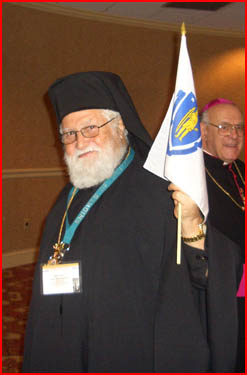
Bishop Elya shows his Massachusetts flag before the dinner
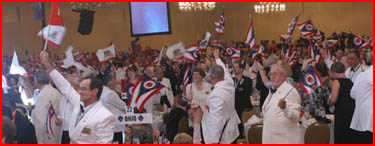
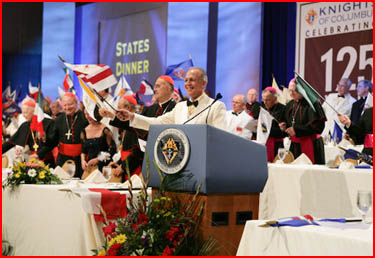
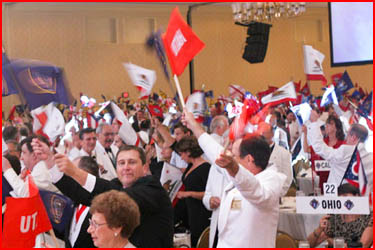
Delegations from each state waive their flags
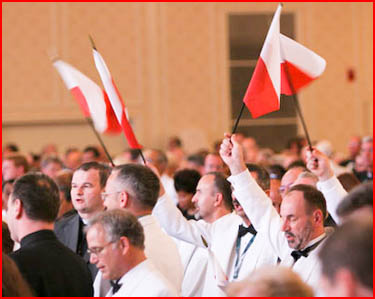
The group from Poland
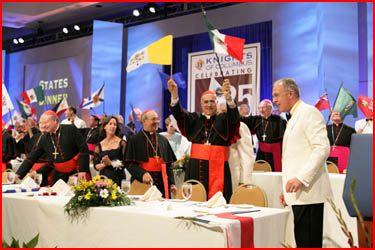
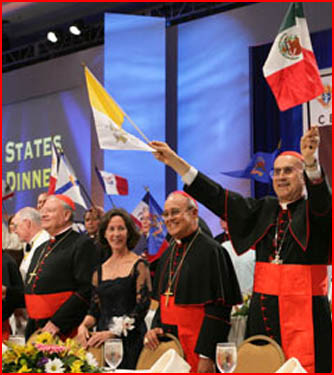
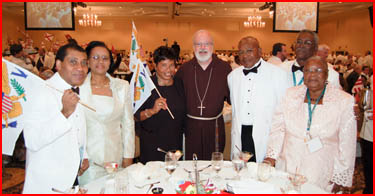
They also gave me a Virgin Islands flag,
so I took this picture with a group from my previous diocese
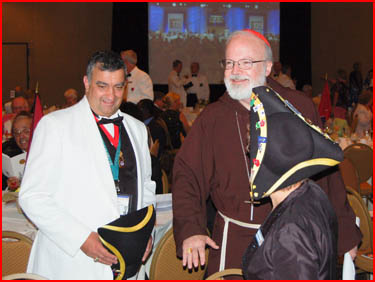
The Massachusetts people wear the three-cornered colonial hats
Carl Anderson presented some of the achievements of the Knights in recent years at the banquet. Anderson is an outstanding layman, a man of great intellectual and spiritual resources who is a wonderful leader of the Knights. He said that last year the Knights contributed $143 million in donations, $109 million of which came from state and local councils. The largest donors, the knights who gave the most per capita, were the knights from the providence of Quebec, Canada, which I thought was very interesting.
Not only have the Knights made great financial contributions to many Catholic causes and to many social causes, to help the poor and the handicapped, but they have also given almost 70 million volunteer hours. If one were to put a price tag on that, it would be worth over $1 billion a year. They have also in the last year organized almost 400,000 blood donations and 6 million visits to the sick.
The Knights are now at their highest membership ever with 1.7 million knights. In the last year alone 250 new councils have formed. The latest country they have gone to is Poland. They now have eight active councils in that country. There was a nice Polish representation at the convention. The Knights have also reached out to college campuses, and there are 128 college campuses that have councils. They are, of course, working with the squires and young men. In addition, they have 49 military councils and have provided almost a half million prayer books for the soldiers. Archbishop Edwin O’Brien says that it is one of the best tools of evangelization that he has experienced in his time as a chaplain of the Archdiocese for the Military Services.
The Knights have certainly been so supportive of the Church, priests, vocations, family life, the Gospel of Life and the handicapped. They really have a remarkable record, and I am sure that listening to Carl Anderson’s report made everyone there feel very proud to be Catholic and to be associated with the Knights of Columbus. I want to share with you a portion of his report that had to do with responsible citizenship and particularly with the Knights commitment to the pro-life cause and the defense of marriage:
Canadian Knights, in partnership with their bishops and the Catholic Organization for Life and Family, have fought abortion on demand there. In México, the Philippines and Poland, international abortion rights groups are now putting on the pressure to recognize a similar access to abortion. In each of these countries, Knights stand on the front line to battle for the right to life.
And that is precisely where we will continue to stand.

Carl Anderson
We are the backbone of the annual March for Life in Washington, D.C., and the Canadian March for Life in Ottawa. A few months ago, when the government of México City sought wider legalization of abortion, Knights there helped lead the public response. One newspaper said it was the first time the Knights of Columbus had marched in the streets there since the time of the Cristeros.
No matter the country or continent, we Knights of Columbus will never accept a society where innocent unborn children are victimized by abortion.
On this issue we have made our own the words of Winston Churchill, who said during some of the darkest days of World War II, “This is the lesson: Never give in, never give in, never, never, never – in nothing, great or small.” My brother Knights and ladies: On abortion, we will never give in.
We will fight on until the day when society once again protects the right to life of every unborn child. We applaud the U.S. Supreme Court for taking the first step in ending the regime of abortion on demand through its decision upholding the Partial Birth Abortion Ban. This decision confirms and strengthens our resolve to continue to fight for the nomination and confirmation of justices who know that a judge’s job is to interpret the law and not to invent “rights” that are nothing more than an excuse to impose their own notion of proper public policy.
Last fall, we vigorously joined the battle in Missouri against a state constitutional amendment to fund embryonic stem cell research. Proponents who stood to gain financially from the amendment spent enormous sums of money on misleading ads. They won, but by a much narrower margin than had been predicted. But the battle is not over, in Missouri or anywhere else. We helped to win a significant victory in Delaware by defeating in the state House of Representatives a bill promoting embryonic stem cell research.
We provide major financial support to the National Catholic Bioethics Center, and major funding for the U.S. bishops’ pro-life education campaign. We will keep working with them to educate every citizen about the immorality of embryonic stem cell research.
One of the most difficult battles we face today is the threat to the institution of marriage. In Canada, just a day after my historic meeting with Prime Minister Stephen Harper, Parliament refused to reconsider Bill C-38, which legalized same-sex marriage. But Canadian Knights are not going to give up the battle.
In the United States last fall, Knights were instrumental in helping to win passage of state constitutional amendments protecting marriage in seven of the eight states where an amendment was on the ballot. Twenty-seven states now have constitutional protections for marriage, and referendums will be on the ballot in other states next year as well. In these efforts we have a simple strategy – trust the people to decide.
That is why in Massachusetts, Knights were in the forefront of a drive that gathered a record 170,000 signatures on petitions to put the issue of same-sex marriage before the voters. Yet the state legislature refused. The effort had been approved earlier in the year, but failed this time by five votes. With all their talk about democracy, legislators refused to trust the people – they refused to give the people of Massachusetts the final say.
Our goal will always be to pursue laws that protect the life and dignity of every person, and the integrity of marriage and family. We must pray for, and support, those of every party who stand firmly on the side of life and family. And we must also pray for those who know what is right, but who are weak when the moment of decision is at hand.
I know there are some – even some Catholics – who say it is time to put issues such as abortion behind us. But today, as we reflect on the great history of the Knights of Columbus – of brother Knights who through the years stood strong against the bigotry of the Know-Nothings and the Ku Klux Klan and during the persecution of the Church in México – when we remember this proud tradition, we have to ask: What kind of Catholics do they think we are? Is it possible that they do not realize that we will never cease to persevere against the evil of abortion?
My thanks to the Knights of Columbus national organization for sharing some of their photos of the States Dinner and Mass with us.
I’d also like to share with you some other photos from the Massachusetts delegation.
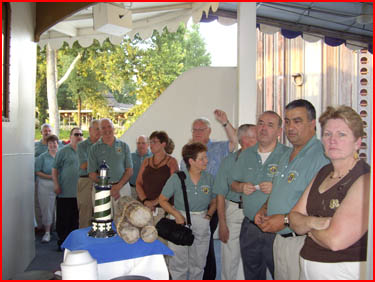
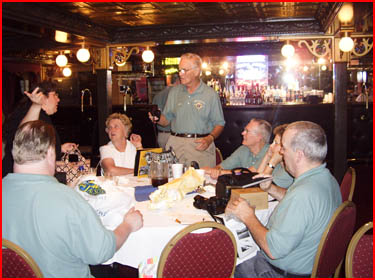
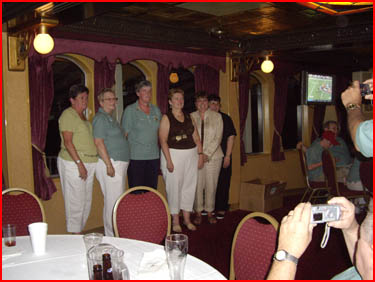
For the photo of the week, I have selected this photo wearing my colonial tricorn hat along with the rest of the Massachusetts group.

Yours in Christ.
Cardinal Seán
